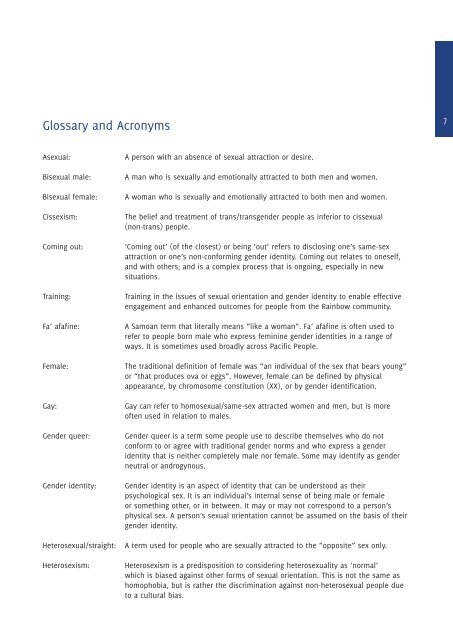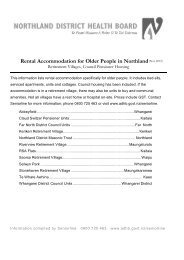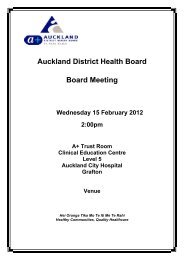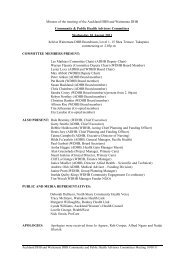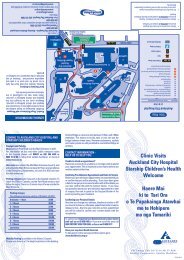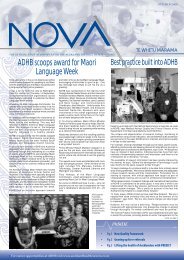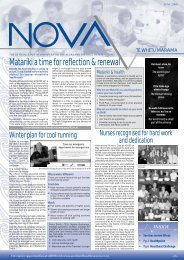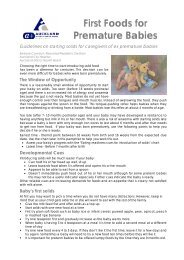Lets talk about sex.... - Auckland District Health Board
Lets talk about sex.... - Auckland District Health Board
Lets talk about sex.... - Auckland District Health Board
Create successful ePaper yourself
Turn your PDF publications into a flip-book with our unique Google optimized e-Paper software.
Glossary and Acronyms<br />
A<strong>sex</strong>ual: A person with an absence of <strong>sex</strong>ual attraction or desire.<br />
Bi<strong>sex</strong>ual male: A man who is <strong>sex</strong>ually and emotionally attracted to both men and women.<br />
Bi<strong>sex</strong>ual female: A woman who is <strong>sex</strong>ually and emotionally attracted to both men and women.<br />
Cis<strong>sex</strong>ism: The belief and treatment of trans/transgender people as inferior to cis<strong>sex</strong>ual<br />
(non-trans) people.<br />
Coming out: ‘Coming out’ (of the closest) or being ‘out’ refers to disclosing one’s same-<strong>sex</strong><br />
attraction or one’s non-conforming gender identity. Coming out relates to oneself,<br />
and with others; and is a complex process that is ongoing, especially in new<br />
situations.<br />
Training: Training in the issues of <strong>sex</strong>ual orientation and gender identity to enable effective<br />
engagement and enhanced outcomes for people from the Rainbow community.<br />
Fa’ afafine: A Samoan term that literally means “like a woman”. Fa’ afafine is often used to<br />
refer to people born male who express feminine gender identities in a range of<br />
ways. It is sometimes used broadly across Pacific People.<br />
Female: The traditional definition of female was “an individual of the <strong>sex</strong> that bears young”<br />
or “that produces ova or eggs”. However, female can be defined by physical<br />
appearance, by chromosome constitution (XX), or by gender identification.<br />
Gay: Gay can refer to homo<strong>sex</strong>ual/same-<strong>sex</strong> attracted women and men, but is more<br />
often used in relation to males.<br />
Gender queer: Gender queer is a term some people use to describe themselves who do not<br />
conform to or agree with traditional gender norms and who express a gender<br />
identity that is neither completely male nor female. Some may identify as gender<br />
neutral or androgynous.<br />
Gender identity: Gender identity is an aspect of identity that can be understood as their<br />
psychological <strong>sex</strong>. It is an individual’s internal sense of being male or female<br />
or something other, or in between. It may or may not correspond to a person’s<br />
physical <strong>sex</strong>. A person’s <strong>sex</strong>ual orientation cannot be assumed on the basis of their<br />
gender identity.<br />
Hetero<strong>sex</strong>ual/straight: A term used for people who are <strong>sex</strong>ually attracted to the “opposite” <strong>sex</strong> only.<br />
Hetero<strong>sex</strong>ism: Hetero<strong>sex</strong>ism is a predisposition to considering hetero<strong>sex</strong>uality as ‘normal’<br />
which is biased against other forms of <strong>sex</strong>ual orientation. This is not the same as<br />
homophobia, but is rather the discrimination against non-hetero<strong>sex</strong>ual people due<br />
to a cultural bias.<br />
7


